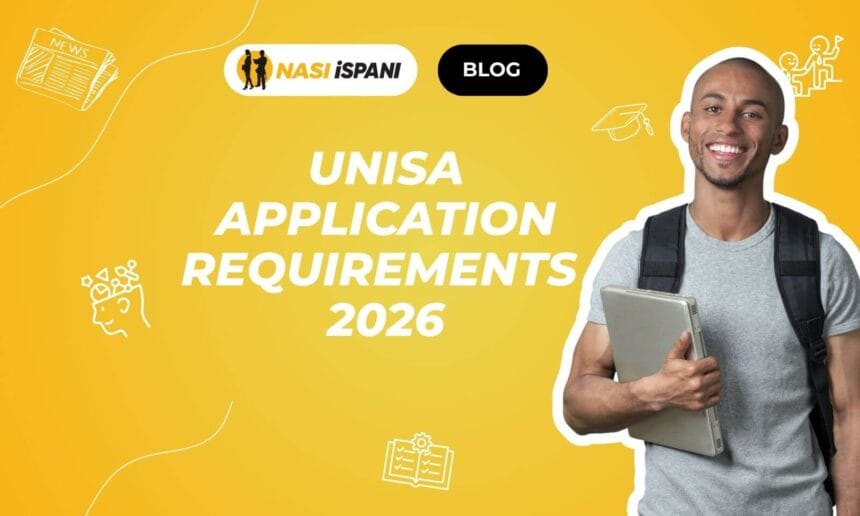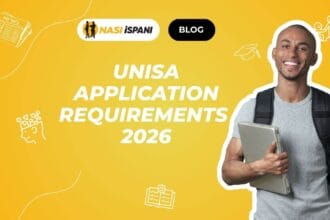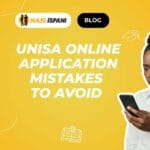Applying to the University of South Africa (UNISA) for 2026 requires careful planning. Understanding the UNISA Application Requirements ensures you submit a complete, accurate application and increases your chances of admission.
This guide covers everything from eligibility, documents, fees, to tips for a smooth application process.
UNISA Application Period 2026
- Undergraduate Qualifications: 18 August 2025 – 10 October 2025
- Honours, Master’s, and Doctoral Degrees: 2 September 2025 – 21 November 2025
Tip: Submit early to avoid technical issues and missing deadlines.
Who Should Apply?
You must meet the UNISA Application Requirements if you:
- Are applying to UNISA for the first time
- Are a current student changing your qualification or specialization
- Were previously offered a place but did not register
- Are completing a higher certificate and wish to progress to undergraduate studies
Important: Returning students for the same qualification do not need to reapply—they simply register for the next semester.
Learn more: UNISA Status Check: How to Track Your Application for 2026
UNISA Academic Requirements
Meeting the UNISA Application Requirements includes satisfying specific academic criteria. This ensures you are prepared for the rigours of your chosen qualification. The main academic requirements include APS, matriculation eligibility, and Recognition of Prior Learning (RPL).
1. Minimum Academic Points Score (APS)
The Academic Points Score (APS) is a standardized way UNISA evaluates your matric results to determine eligibility for a specific qualification. Each subject grade is assigned points as follows:
- A = 7 points
- B = 6 points
- C = 5 points
- D = 4 points
- E = 3 points
- F = 2 points
The total APS is calculated by adding the points from your best subjects, usually including key subjects required for the qualification.
Example:
For a Bachelor of Commerce (BCom) program requiring an APS of 25:
| Subject | Grade | Points |
|---|---|---|
| Mathematics | B | 6 |
| English | C | 5 |
| Accounting | B | 6 |
| Economics | C | 5 |
| Life Orientation | D | 4 |
| Total APS | 26 |
Tip: Always check the APS requirements for your specific qualification on the UNISA website, as different programs may require different combinations of subjects and total points.
2. Matriculation Requirements
Depending on your educational background, UNISA has specific matriculation requirements:
- National Senior Certificate (NSC):
Applicants must meet the minimum APS and subject-specific requirements. For example, a BCom may require a minimum grade in Mathematics and English. - Senior Certificate (pre-2008):
If you completed your matric before 2008, you may need to check equivalency tables to ensure your qualification meets current admission standards. Some older certificates may require additional bridging courses. - Foreign Qualifications:
International applicants must have their qualifications evaluated by SAQA (South African Qualifications Authority) to confirm equivalency with South African standards. This ensures that your previous studies meet the academic level required for your intended UNISA qualification.
Tip: Keep certified copies of all certificates and academic transcripts ready when applying, as these documents are required for verification.
3. Recognition of Prior Learning (RPL)
UNISA offers RPL for applicants who do not have formal matric but have relevant work experience, prior study, or informal learning that can be credited toward a qualification.
To apply via RPL, you must submit:
- DSAR04 Form: The official form for RPL applications
- Certified Academic Transcripts: From previous institutions or training programs
- Conduct Certificate: Confirming good standing from previous learning institutions
- Syllabi of Previous Studies: To demonstrate coverage of relevant material
- SAQA Evaluation: Required for international qualifications
Example:
If you completed a professional certificate in Business Administration abroad but do not have a matric, UNISA can assess whether your prior learning meets the minimum academic requirements for a higher certificate or diploma in Business Management.
Tip: Start the RPL process early, as evaluating prior learning can take several weeks.
Documents Required for UNISA Application 2026
Before applying, prepare the following documents:
- Certified ID or Passport Copy
- Certified Copies of Academic Qualifications
- Proof of Payment of Application Fee (R150)
- SAQA Evaluation for international qualifications
- Syllabus (if using RPL or foreign qualifications)
Tip: Ensure all copies are certified by a commissioner of oaths. Applications missing documents may be declined.
Learn More: UNISA 2026 Applications: All Documents You Need to Apply Successfully
Additional Tips for Meeting UNISA Application Requirements
Successfully meeting the UNISA Application Requirements involves more than just submitting an application. Careful preparation, organization, and attention to detail can significantly increase your chances of acceptance. Here are key tips to help you navigate the process:
1. Know Your Qualification
Before applying, thoroughly research your chosen qualification. Each program has specific subject and APS requirements, and some may have additional prerequisites such as:
- Mathematics or Accounting for commerce-related degrees
- Science or Technology subjects for engineering and IT programs
- Language proficiency requirements for certain humanities courses
Tip: Visit the UNISA qualification pages and review subject and APS requirements carefully. Choosing a program that aligns with your academic profile reduces the risk of your application being declined.
2. Prepare Documents Early
Ensure all your documents are ready and certified before starting your online application. Required documents include:
- Certified ID or passport copy
- Academic transcripts and certificates
- Proof of application fee payment
- SAQA evaluation for international qualifications
- Syllabi for Recognition of Prior Learning (if applicable)
Tip: Make digital copies in PDF format. UNISA typically requires uploads within 10 working days, and missing or incorrect documents can delay or block your application.
3. Monitor Communications
UNISA communicates important updates via email, SMS, and your student portal. To stay informed:
- Provide a valid email address and cellphone number during application
- Check your inbox and spam folder regularly
- Respond promptly to requests for additional documents or clarifications
Example: If UNISA requests verification of foreign qualifications, failing to respond quickly may result in your application being declined.
4. Submit Early
Submitting your application early has several advantages:
- Reduces the risk of website crashes close to the deadline
- Gives you extra time to correct errors or upload missing documents
- Allows for early consideration for programs with limited spaces
Tip: Even if all your documents are not yet ready, submit your application and then upload documents within the 10-day window.
5. Check Financial Aid Opportunities
If you plan to apply for NSFAS (National Student Financial Aid Scheme) or other scholarships:
- Ensure your application aligns with NSFAS deadlines
- Keep your personal and financial documents updated
- Understand the requirements for eligibility and submission
Example: Some NSFAS applications close before the UNISA application deadline, so planning ahead ensures you don’t miss out on funding opportunities.
6. Stay Organized and Keep Records
Maintaining a record of all applications, receipts, and correspondence helps if issues arise:
- Save copies of your online application confirmation
- Keep a folder with certified documents
- Note deadlines for submitting supporting documents and fees
Tip: Use a checklist to track each step of your application. This reduces the risk of missing requirements and keeps you on track for a successful submission.
7. Plan for the First-Year Experience (FYE) MOOC
First-time undergraduate applicants are required to complete the First-Year Experience MOOC before accepting their offer. Completing it early ensures you:
- Meet UNISA’s compliance requirements
- Get familiar with online learning and UNISA’s platforms
- Prepare for academic success from the first semester
Frequently Asked Questions (FAQs)
Q1: Can I apply if I don’t meet the APS?
A1: Yes. If you do not meet the APS for your chosen qualification, you may explore alternative qualifications with lower APS requirements, or apply through Recognition of Prior Learning (RPL) if you have relevant work experience or prior studies. UNISA also offers higher certificates as bridging options to help you qualify for a degree in the future.
Q2: How long does it take to get a response?
A2: UNISA typically processes applications within a few weeks after submission, but timelines can vary depending on the qualification and application volume. You should regularly check your email, SMS, and the myUnisa portal for updates.
Q3: Can international students apply?
A3: Yes, international students can apply to UNISA. However, foreign qualifications must be evaluated by the South African Qualifications Authority (SAQA) to confirm equivalency. International students may also be required to pay application and tuition fees via Flywire.
Q4: Is the application fee refundable?
A4: No. The application fee of R150 is non-refundable, regardless of the outcome of your application. Ensure you meet the UNISA Application Requirements before paying the fee.
Q5: Do I need a student number to apply?
A5: Yes. First-time applicants must apply for and receive a UNISA student number before completing the online application form. Student numbers issued for short learning programmes are not valid for formal qualifications.
Q6: What happens if I forget to upload documents?
A6: If you fail to upload required supporting documents within 10 working days of submitting your application, your application may be incomplete and could be rejected. Always have certified copies of your documents ready before applying.
Q7: Can I apply for more than one qualification?
A7: Yes, you can apply for a maximum of two qualifications during the same application period. If both are approved, you must choose which one to register for. This increases your chances of securing a place at UNISA.
Q8: What is the First-Year Experience (FYE) MOOC, and why is it required?
A8: The FYE MOOC is a free, online orientation course for first-time undergraduate applicants. It introduces students to UNISA’s online learning system, academic expectations, and study strategies. Completion is mandatory before you can accept your admission offer.
Q9: What if I was previously accepted but didn’t register?
A9: If you were offered a place in a previous year but did not register, you must reapply during the 2026 application period. Admission offers are only valid for the year in which they are issued.
Q10: How do I know if I qualify for financial aid?
A10: You may apply for funding through NSFAS if you meet their eligibility criteria (usually based on household income, academic progress, and citizenship). NSFAS deadlines may close before UNISA’s, so check their website early and prepare financial documents in advance.
Applying to UNISA for 2026 is an exciting step toward building your academic and career future. However, success starts with meeting the UNISA Application Requirements. From understanding your APS score and ensuring you meet subject prerequisites, to preparing certified documents and monitoring application deadlines, every detail counts.
Whether you’re a first-time applicant, progressing from a higher certificate, or an international student, taking the time to prepare thoroughly will increase your chances of admission. Remember to apply early, stay updated on your application status, and explore financial aid options like NSFAS if you qualify.
By meeting the requirements and planning ahead, you’ll position yourself for a smooth application process and a strong start to your UNISA journey in 2026.




